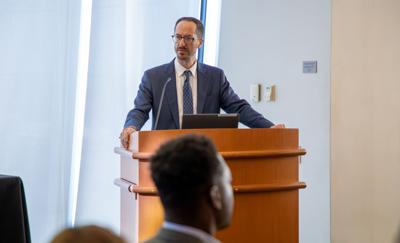Metro is putting $20 million in American Rescue Plan funds toward a new initiative to preserve and develop affordable housing, Mayor Freddie O'Connell announced Friday morning.
The Nashville Catalyst Fund will provide capital to developers who create income-restricted housing for at least 30 years. In addition to Metro's initial funds, First Horizon has committed to a $50 million credit facility loan, and Vanderbilt University has contributed $5 million. The Catalyst Fund aims to raise $25 million more for a total investment of $100 million in affordable housing.
“First Horizon believes investing time and resources in the communities in which we operate leads to success for all,” Carol Yochem, First Horizon Bank region president, says in a release. “We are proud to be the lead bank providing capital to the Catalyst Fund."
The goal of the fund is to jumpstart projects so developers do not need to wait on public subsidies or grants to develop affordable housing products. Metro says in the release the first $75 million can lead to the preservation or creation of at least 3,000 units over the next 10 years.
Forsyth Street Asset Management will manage the fund and seek out other investors. The Community Foundation of Middle Tennessee, Pillars Development and Nelson Community Partners will also collaborate to manage the fund. An investment committee led by Jim Gingrich of the Community Foundation will be in charge of lending decisions for the fund.
Activists, developers and city officials are trying to tackle the affordable housing crisis in a variety of ways. Will it be enough before 2030?
"Nashville needs an all hands on deck approach to solving our affordable housing shortage,” Hal Cato, CEO of the Community Foundation of Middle Tennessee, says in the release. “The Catalyst Fund represents a new level of collaboration between philanthropy, business, and government towards a future where everyone in Nashville can have a place that they call home.”
Other committee members include Hannah Davis, Metro Housing Division; Bert Mathews, The Mathews Company; Adriane Harris, HarCo; Ryan Fleming, Enterprise Community Loan Fund; and Tifinie Capehart, Parks–Compass.
At the mayor's roundtable Friday morning, Cato said that the investment committee is already reviewing about a dozen projects and hopes of having the first deal done by the end of August. Mayor O'Connell said in the meeting that this is another tool alongside the Barnes Fund, which is aimed mostly at new projects. He added the Catalyst Fund hopes to "reduce the likelihood that people get displaced" by providing the capital needed for developers to preserve already existing affordable housing.
Earlier this week, Metro also announced receipt of a $5 million federal Housing and Urban Development grant.
Metro applied for the Pathways to Removing Obstacles to Housing in 2023 and HUD announced the $85 million in 21 awards given out across the country on Wednesday. The mayor said in Friday's roundtable that Metro will share more about how those funds will be used in the coming weeks.
A summary of Metro's grant application provided by HUD mentions Nashville's recent actions to boost the housing supply, including $20 million in ARPA funds that were set aside for the Catalyst Fund, the Connecting Housing to Infrastructure Program and the mixed-income payment in lieu of taxes (PILOT) funding.
The application summary also states that the funds could be used to establish an "Affordable Housing Finance Program to build permanent supportive housing and deeply affordable housing in high-opportunity areas." It also states that Metro will "launch a Housing Accelerator Program" to support emerging developers, community organizations and small businesses.
Recognizing barriers to housing in the application, Metro says only 7 percent of land in Nashville allows for multifamily apartment construction, and per-acre land values in 2022-2023 have risen to six times as high as sales in 2010-2013.
This article was first published by our sister publication, the Nashville Post.






